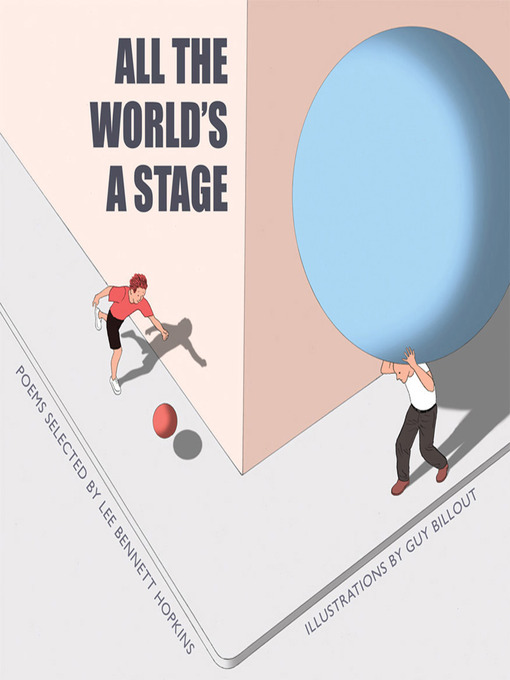
All the World's a Stage
کتاب های مرتبط
- اطلاعات
- نقد و بررسی
- دیدگاه کاربران
نقد و بررسی

October 14, 2013
Poet and anthologist Hopkins (Nasty Bugs) reads Shakespeare's "All the World's a Stage" soliloquy not as a meditation on the futility of existence, but as a straightforward account of the stages of human development. He uses it to frame a selection of 21 mostly modern-era, mostly free-verse poems, accompanied by French artist Billout's (Journey) crisp, surrealist spreads. In the section titled "Adulthood" ("And then the justice,/ In fair round belly with good capon lin'd"), Paul Janeczko reminisces about his mother's hot night at bingo. "She pulled dollars bills/ from her pockets/ before setting them free. âNinety-two dollars!' " In the final section, "Exits" ("Last scene of all..."), Cynthia Cotten mourns: "Once I ran to meet tomorrow./ Now I sit/ and wait." Billout borrows Magritte's eye for enigma. An infant in a ballroom discovers that the tiled floor ripples like a pond; a hiker gazes into a deep chasm and finds it opens onto the night sky. The pictures feel cool, the Shakespeare passages lofty, the poetry familiar and chatty, and the type and layout starkâit's a hodgepodge of tones and registers. Ages 8âup.

October 1, 2013
Like the old man's hose, Shakespeare's "Seven Ages of Man" speech is "a world too wide" to be well-served by this paltry selection of 21 poems, three per "age." Hopkins tries to inject some color into the mix with Walt Whitman's "When I heard the learn'd astronomer," Elizabeth Barrett Browning's "How do I love thee?" and Lewis Carroll's "You are old, father William." Unfortunately, these, combined with passages from the speech itself, only make his other choices look anemic. To the "infant, / Mewling and puking in the nurse's arms," for instance, Rebecca Kai Dotlich offers a bland "Amazing, your face. / Amazing"; on the facing page, a "traditional Nigerian lullaby" is stripped of music: "Sleep my baby near to me. / Lu lu lu lu lu lu." Along with Joan Bransfield Graham's "A Soldier's Letter to a Newborn Daughter," which ends with a condescending "I'm coming home / to my girls... / With All My Love, / DAD," most of the rest are cast in prosaic free verse. Hopkins' "Curtain," probably written for this collection, closes the set with theatrical imagery. Billout supplies pale, distant views of small figures and some surreal elements in largely empty settings--appropriate, considering the poetry, but they lack either appeal for young audiences or any evocation of the Shakespearean lines' vigorous language and snarky tone. A poor performance, "[s]ans teeth, sans eyes, sans taste, sans everything." (introduction, indexes) (Poetry. 8-11, adult)
COPYRIGHT(2013) Kirkus Reviews, ALL RIGHTS RESERVED.

January 1, 2014
Gr 4 Up-Building from Shakespeare's "Seven Ages of Man" monologue from As You Like It, Hopkins organizes this collection of poetry according to the seven ages, labeling them: "Entrances," "Childhood," "Love," "War," "Adulthood," "Aged," and "Exits" and allotting three poems for each. Every section opens with a spread of a theater with each life stage portrayed inside, beginning with "At first the infant..." and taking readers through to the "Last Scene" stage. The stark, surreal art delivers small bites of emotion and symbolism. The 21 selections come from a range of poets, mixing Walt Whitman and Lewis Carroll with modern children's poets such as Janet S. Wong and Kate Coombs. The unique concept behind this book allows readers to look at both the monologue and the poetry in a new way. While the picture book trimsize suggests younger readers, the content will resonate most for those with more life experience to bring to it. An explanatory introduction is included.-Julie Roach, Cambridge Public Library, MA
Copyright 2014 School Library Journal, LLC Used with permission.

December 15, 2013
Grades 3-6 Poet and anthologist Hopkins uses the seven stages in the famous Seven Stages of Man monologue from William Shakespeare's As You Like It as the framework for a collection of 21 poems reflecting on the journey of life. The varied selections range from a traditional Nigerian lullaby and works by Walt Whitman and Lewis Carroll to two poems by Hopkins himself. Each stage is represented by three poems and introduced with a mannered yet surreal double-page illustration framed by columns suggesting a theater, as well as the first few words from Shakespeare's monologue that are specific to the segment. The pages with the poems are artistically balanced, featuring text in a small, plain font and one or two illustrations against a stark white background. Each of the illustrations, symbolic in nature, have only one or two small characters placed in a vast expanse of space, exuding a sense of coldness and loneliness that is often in contrast to the tenderness of the poems; Act FourWar is particularly heart wrenching. Though spare, this is thought provoking, beautifully designed, and enjoyable.(Reprinted with permission of Booklist, copyright 2013, American Library Association.)

























دیدگاه کاربران